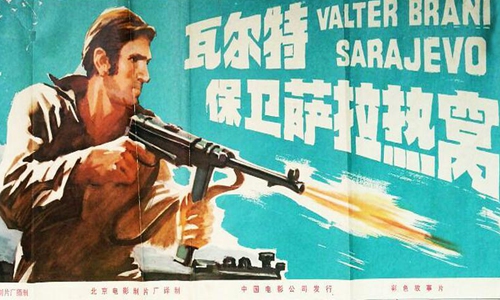HOME >> ARTS
Serbian Embassy’s ‘spelling mistake,’ former Yugoslavian films go viral in China
By Bi Mengying Source:Global Times Published: 2020/3/24 17:08:40

Promotional material for Walter Defends Sarajevo Photo: Courtesy of Maoyan

Promotional material for Walter Defends Sarajevo Photo: Courtesy of Maoyan
Amid the ongoing COVID-19 pandemic, Serbia has become a trending topic on China's Twitter-like Sina Weibo. One popular hashtag in particular stemmed from a post about Serbian President Aleksandar Vucic greeting Chinese doctors who arrived in Serbia to support the country's fight against the virus and kissing the Chinese national flag to show his gratitude.
The hashtag #RevisionHistoryOfSerbianEmbassy had received over 180 million hits, and 26,000 reposts as of Monday.
The hashtag was created after the Serbian Embassy posted a message on Sina Weibo, "Here come tieban friends! Serbian President Aleksandar Vucic welcomed Chinese doctors and kissed the Chinese national flag."
In Chinese, tieban means "iron board" and many said the embassy was probably trying to say the doctors were made of "iron." However, the word is usually used to describe Japanese teppanyaki in China.
After netizens pointed out the mistake, several revisions followed, where tieban was first changed into tiegang, most likely an attempt of gangtie, or steel, but backwards. However, the second attempt was also incorrect as the wrong character had been used for gang, thus making the error a spelling mistake.
The gang was replaced with the correct character, but it was backwards. Finally, the last post from the embassy landed on tiegan (meaning loyal and firm) friends.
Chinese netizen comments included, "No matter if it's tieban, tiegang or tiegan friends, we are friends for sure," and "let's fight this pandemic and stay strong together! When it ends, I really look forward to visiting Serbia."
While the tiegan friendship between the countries has strengthened amid the COVID-19 pandemic, their relationship and cultural exchanges share an extended history, especially when it comes to film. Discussion about Serbian films has been on the rise among Chinese on social media since the country's president first asked for support to combat COVID-19 on March 15.
Take the cult favorite Walter Defends Sarajevo for instance. The film was once very popular in China because of its anti-fascist values and unity.
The Xinhua News Agency reported that since 1973, roughly 2 billion people in China had seen the film, which has an 8.7/10 on Chinese media review website Douban.
"Many people of my age have seen it. My school organized a screening so we could watch it. Of course, it was dubbed in Chinese. I still remember the scenes from the film. We were so hooked that none of us wanted to go for a bathroom break," Dehe, a 61-year-old Chinese viewer, told the Global Times.
The film was shown recently on China Central Television's (CCTV) movie channel. While it brought back shared memories for older viewers, it also gave younger netizens a chance to watch the film for the first time and inspire them to learn more about Serbian films.
After the news of death of the film's lead actor Velimir Bata Živojinovic spread to China in 2016, Chinese people remembered this star in various ways.
The star had visited China a dozen times, attending events such as the 2010 Shanghai Expo.
The iconic war film, The Bridge, released in 1969, is another favorite. It has an 8.8/10 rating on Douban.
Many netizens said they saw it twice after watching the recent news about Serbia.
In May 2019, China signed a collaboration agreement with Serbia, Bosnia and Herzegovina to remake The Bridge, with production to begin in early 2020.
In response to netizens' interest in learning more about Serbia, many film-related blogs such as 1905.com and the official website of CCTV's Movie Channel have started to provide more recommendations on new Serbian films and TV dramas.
Newspaper headline: ‘Iron’ friendship
Posted in: FILM,CULTURE & LEISURE